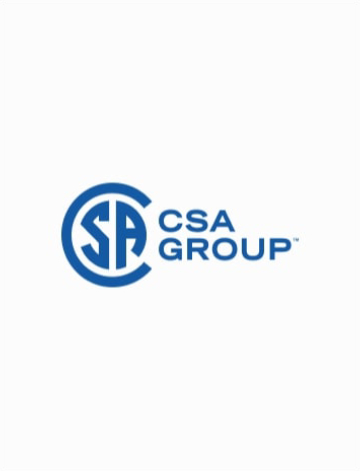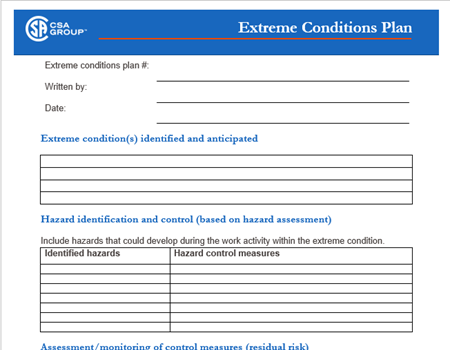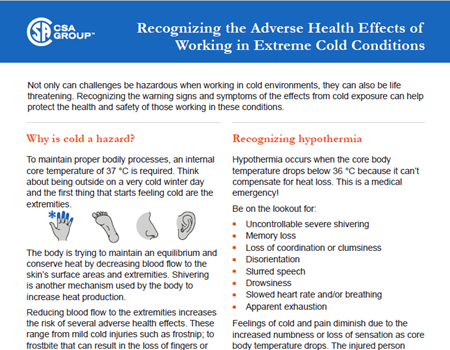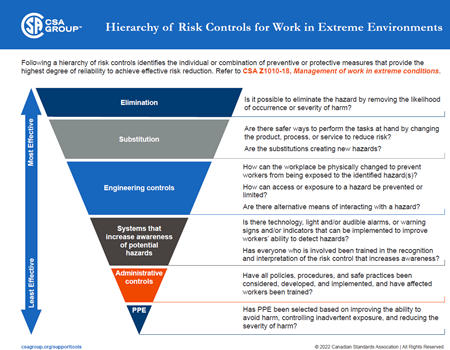Preface
This is the first edition of CSA Z1010, Management of work in extreme conditions. It is based on an Express Document, CSA EXP1010, published in 2016.
The purpose of this Standard is to address the application of occupational health and safety management systems to plans for work performed under heightened-risk conditions presented by extreme environmental temperatures, severe weather, low or high atmospheric pressure, and poor air quality (causing impairment of breathing or visibility). CSA Z1010 is the latest addition to the Z1000 series of OHS management systems standards. It is designed to be used within an OHS management system in conjunction with the other standards in the Z1000 series.
This document has been developed by the Technical Committee on Work in Extreme Conditions, under the jurisdiction of the Strategic Steering Committee on Occupational Health and Safety, and will be submitted for formal approved by the Technical Committee.
This Standard has been developed in compliance with Standards Council of Canada requirements for National Standards of Canada. It has been published as a National Standard of Canada by CSA Group.
Scope
1.1
This Standard, following the principles set out in CAN/CSA-Z1000, specifies requirements for
a) establishing and maintaining an extreme conditions management system in accordance with occupational health and safety management system (OHSMS) principles;
b) the roles and responsibilities of the management representative, the monitoring team, and the worker;
c) management of external service providers;
d) establishing the parameters of extreme conditions;
e) hazard identification and risk assessment relating to work in extreme conditions, including
i) high winds, tornados, hurricanes;
ii) extreme temperatures, hot and cold, humidity and wind-chill;
iii) heavy rain, lightning, flash flooding;
iv) icy conditions — ice buildup, slippery conditions, sleet and hail;
v) poor visibility (e.g., absence of light, fog, smoke, smog, etc.);
vi) terrain — rough, rocky, uneven, sloped;
vii) high altitude — low atmospheric pressure, hyperbaric – pressurized atmosphere; and
viii) ice roads — thickness, travel safety both individually and in combination, as well as considering risk escalation factors; and
f) management and control of hazards and risk relating to work in extreme conditions, including
i) development of general safety procedures for extreme conditions;
ii) personal protective equipment (PPE) and apparel used for work in extreme conditions;
iii) health and safety monitoring systems for work in cold, damp, and high winds, as well as work in extreme heat and high humidity (both indoors and outdoors);
iv) health and safety monitoring systems for inclement weather and storms involving high winds, heavy rains, tornados, sleet and hail, lightning, and other severe weather conditions;
v) health and safety monitoring systems for work at high altitude, low atmospheric conditions and pressurized atmosphere, hyperbaric conditions (individually or in combination);
vi) emergency rescue plan development and implementation;
vii) travel/transportation to and from workplace;
viii) training for work in extreme conditions; and
ix) determining fitness for work in extreme conditions.
1.2
This Standard does not specifically address safety management of
a) exposure to ionizing radiation;
b) toxic or caustic atmospheres;
c) high-noise and high-vibration environments;
d) work in underwater environments;
e) exposure to dangerous animals, insects, or plants; and
f) man-made conditions resulting from socio-political situations.
1.3
This Standard is designed to be used with related health and safety management standards, as well as related procedural standards. It is intended to be referenced by other standards as the primary set of requirements for health and safety management of work in extreme conditions. Although this Standard takes into consideration provincial, territorial, and federal legislation, it is not constrained by these regulations. It is intended to be used in conjunction with all provincial, territorial, or federal jurisdictions, and is designed for use in workplaces in all regions of Canada.
1.4
This Standard is designed for voluntary application in Canadian workplaces. However, the principles established in this Standard are based on best practices recognized internationally. As such, they may be applied to any workplace involving extreme conditions.
1.5
In this Standard, “shall” is used to express a requirement, i.e., a provision that the user is obliged to satisfy in order to comply with the standard; “should” is used to express a recommendation or that which is advised but not required; and “may” is used to express an option or that which is permissible within the limits of the Standard.
Notes accompanying clauses do not include requirements or alternative requirements; the purpose of a note accompanying a clause is to separate from the text explanatory or informative material.
Notes to tables and figures are considered part of the table or figure and may be written as requirements.
Annexes are designated normative (mandatory) or informative (non-mandatory) to define their application.
1.6
The values given in SI units are the units of record for the purpose of this Standard. The values given in parentheses are for information and comparison only.






